March 17, 2022
by Carole Zangari -
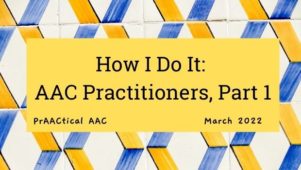
In today’s Throwback Thursday, we learn from AAC professionals who’ve shared their experiences, perspectives, suggestions, and materials. We’ve had a lot of these posts over the years, so we’ll do this in two parts, both with lots of great content. Take a look. How I Do It Tabi Jones-Wohleber Classroom CORE Book AAC Inservices The All-in-One-Visual-Support Tool Deanna Wagner Supporting Spanish-speaking AAC Learners Lindsay Oesch Bilingual AAC Assessment Tips Kim Ho Video Read-Alouds with Aided Language Input Krista Hadeed Building & Using Language Kits Jesse Kleinman Functional Ideas for AAC Use at Home Kathrine Dally Pocket Flipbooks for Teens Pocket Flipbooks for Adults & Teens Pocket Flipbooks for Adults & Teens, Part 2 Amanda Samperi Teaching the AAC Helpers Planning AAC Therapy Activities Across Grade Levels Putting the FUN Back in FUNctional Working with Multiple Symbol Sets Tina Moreno Classroom Support for Students with AAC Needs Laura Hayes Using Videos... [Read More...]
April 4, 2019
by Carole Zangari -
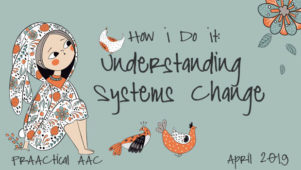
Have you ever dreamed of taking a detour in your AAC work to address the needs from a totally different direction? Special educator Sarah Mueller did just that. Follow along as she tells us about her journey from teacher to student. :::::::::::::::::::::::::::::::::::::::::::::::::::::::::::::::::::::::::::::::::::::::::::::::::: “Autism isn’t something a person has or a ‘shell’ that a person is trapped inside. There’s no normal child hidden behind the autism. Autism is a way of being. It is pervasive; it colors every experience, every sensation, perception, thought, emotion, and encounter, every aspect of existence. It is not possible to separate the autism from the person – and if it were possible, the person you’d have left would not be the same person you started with. This is important, so take a moment to consider it: Autism is a way of being. It is not possible to separate the person from the autism.” – Jim Sinclair... [Read More...]
December 17, 2018
by Carole Zangari -
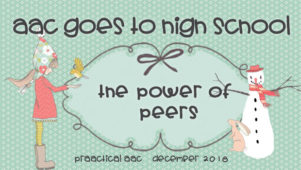
We’re so pleased to welcome back Sarah Mueller, who teaches high school students with intellectual and developmental disabilities in Rochester, Michigan. In this post, she shares her experiences in working with peer mentors and how she has helped to facilitate meaningful relationships between students with and without disabilities. Don’t miss her video or the links to download some of the materials they used. Enjoy! The Power of Peers We often talk about the functions of communication and their importance in developing and expanding the students’ communicative repertoire. Moving beyond requesting to protesting, commenting, and greeting and other functions is often the focus. But as high schoolers included in the school community, my students want to be social with their peers without disabilities. What does that look like for students with complex communication needs? How, as a teacher, can you structure social opportunities to teach and practice core? What... [Read More...]
December 10, 2018
by Carole Zangari -
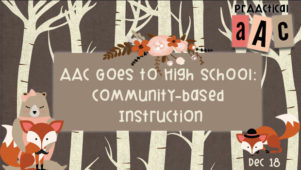
We’re so glad to share the work of Sarah Mueller, a special education teacher in Rochester, Michigan, who returns to talk about AAC with older students. Sarah teaches high school and works with many students who have developmental disabilities. She strives to embed language and communication throughout her students’ entire school experience and help them become strong self-advocates as they prepare for adult life. In this post, Sarah talks about supporting AAC learners who are working with AAC systems rich in core vocabulary as they prepare for their weekly trips into the community. :::::::::::::::::::::::::::::::::::::::::::::::::::::::::::::::::::::::::::::: Core in the Community Core vocabulary is often embedded in the typical instructional tasks of the school day: communication exchanges, calendar time, literacy, etc. Like most high school teachers for students with intellectual disabilities, community-based instruction (CBI) is a component of my classroom program. My classroom becomes the community every single week! It is yet another setting where I... [Read More...]
June 1, 2017
by Carole Zangari -
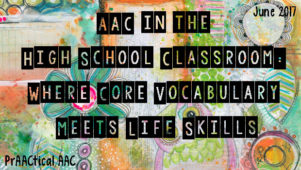
Today, guest blogger Sarah Mueller, a special education teacher in Rochester Michigan, shares her thoughts on supporting core vocabulary learning while working on functional life skills. Sarah teaches high school students with intellectual and developmental disabilities and strives to embed language and communication throughout her students’ entire school experience. Sarah helps her students become strong self-advocates as they prepare for adult life. Marlene Cummings, Sarah’s colleague and mentor, introduces the post. :::::::::::::::::::::::::::::::::::::::::::::::::::::::::::::::::::::::::::::::::::::: I (Marlene Cummings) had the pleasure of meeting Sarah 2 years ago as a new teacher in one of my districts. She immediately engaged in our county level professional learning opportunities in AAC and Literacy. The AAC focus presented strategies to support AAC and language learning including: core vocabulary, aided language input, vocabulary instruction and opportunities. The literacy focus was designed to create and implement a comprehensive literacy program taught by Drs. Karen Erickson and David Koppenhaver. The outcome:... [Read More...]




